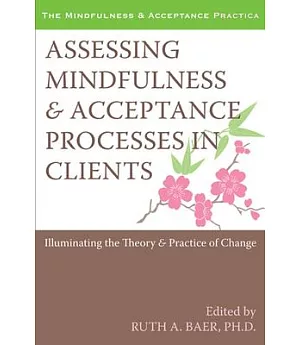"Informed by the maxim that you can't study what you can't see, Baer's book provedes the necessary psychometric underpinning to further our understanding of core change processes in
mindfulness-based interventions."---Zindel V. Segal, Ph.D., author of The Mindful Way Through Depression
"This kind of attention to the reasons why mindfulness-based intervention may be beneficial will help stimulate informative research in the area and also help clinicians provide therapy that
enhances these important skills."---Lizabeth Roemer, Ph.D., coauthor of Mindfulness-and Acceptance-Based Behavioral Therapies in Practice
"An excellent resource not only for mindfulness researchers and practitioners, but for amyone interested in what leads to mental health and emotional balance."---Cassandra Vieten, Ph.D.,
director of research at the Institute of Noetic Sciences and author of Mindful Motherhood
"A fascinating journey to the heart of what actually changes in mindfulness and acceptance-based treatment...Highly recommneded for psychotherapists, health care professionals, and anyone
seeking the very latest scientific understanding of psychological change."---Christopher K. Germer, Ph.D., author of The Mindful Path to Self-Compassion
How does mindfulness work? Thousands of therapists utilize mindfulness-based treatments and have witnesed firsthand the effectiveness of these approaches on clients suffering from anxiety,
depression, and other common mental health issues. But for many clinicians, the psychological processes and brain functions that explain these changes remain a mystery, and effective
methodologies for measuring each client's progress are elusive.
In Assessing Mindfulness and Acceptance Processes in Clients, Ruth Baer presents a collection of articles by some of the most respected mindfulness researchers and therapists practicing today.
Each contribution assesses the variables that represent potential processes of change, such as mindfulness.
acceptance, self-compassion, spirituality, and focus on values, and determines the importance of each of these processes to enhanced psychological functioning and quality of life. Clinicians
learn to accurately measure each process in individual clients, an invaluable skill for any practicing therapist. A seminal contribution to the existing professional literature on
mindfulnessbased treatments, this book is also an essential resource for any mental health professional seeking to illuminate the processes at work behind any mindfulness and acceptance-based
therapy.





















